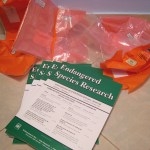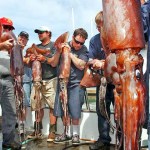What the...?
Even before I knew what it was, I never wanted a blog, because I didn't like how the word sounds. Similarly, the term scibling (which refers to bloggers on scienceblogs.com) always creeped me out. And yet, here I find myself, a scibling and a blogger for more than three years in SEED's network and more or less content. Ask anyone and you'll find I'm fairly uninvolved, rarely take a position, do not contribute to the forums or make a fuss.
Last Wednesday, I saw an email from SEED editor Adam Bly, which everyone knows about by now, in which he defended SEED's decision to allow PepsiCo a…
Tonight we made our way to Cafe du Monde in the French Quarter to witness the New Orleans gathering of Worldwide Protest BP Day. The drizzling weather probably served to separate the men from the boys, as they say, and so good intentions and half-baked messages ran high (see photos from the protest on Fickr).
There were plenty of people opposed to the use of Corexit and one woman rightfully demanded to know why it was banned in Europe but still legal in the U.S. (read more about this issue on the ProPublica blog). There were accusations that the President was doing nothing and that…
Jessie and I made a beeline for New Orleans. We stopped only for gas and a night's rest. In Pachuta, Mississippi, we couldn't resist photographing this sign at a gas station (not BP -- we won't be stopping at BP):
I photographed this sign recently at a church in Cincinnati, Ohio:
Sometimes, something makes you stop and give pause to modernity. Or humanity. Or both. I have had a few such moments lately, like when I saw one of these Mobile Gyms in Vancouver for the first time the other day. Talk about a band-aid on a bullet wound:
And then I came across a book to read so you can talk about books you haven't read:
This Office Depot advertisement is shockingly perverse, given how many small stationary businesses it has probably put out of business:
And this was no biggie, except that it is posted on the door of a public library in Aiken, South Carolina:
And I'll…
After the post on Threatened Trees, a friend passed along this photo of Endangered Species Research journals, which come wrapped in heavy plastic (they are printed on acid-free paper, however).
Will Big Business Save the Earth? This was the title of the New York Times Op-Ed last week by Jared Diamond (UCLA professor and author of Guns, Germs, and Steel and Collapse). I thought we could go through his piece -- piece by piece.
1) He begins:
There is a widespread view, particularly among environmentalists and liberals, that big businesses are environmentally destructive, greedy, evil and driven by short-term profits. I know -- because I used to share that view. But today I have more nuanced feelings.
More nuanced feelings? The New York TImes must not edit for arrogance. Many big…
For the eco-irony of the day, check out this book on threatened trees, which is thicker than a phone book:
A trawler off of Japan capsized as its three man crew tried to haul in their net containing dozens of huge Nomura jellyfish. The three men were rescued but the boat apparently sank. Read the full story in The Telegraph.
Oliver Morton wrote a delightful book all about photosynthesis called Eating the Sun: How Plants Power the Planet, which I reviewed earlier this year for Search Magazine (R.I.P.) under the title "A Song for the Heartless". One of my favorite passages in the book beautifully explains the difference between art and science:
Discoveries feel determined. They are there to be made, and if one person doesn't, another will. This doesn't lessen the achievement; indeed it can give it spice. The thought that 'this is the way the world is--and I am the first to see it as such' is an intoxicating…
There is a reason people are pushing for increased marine protected areas (which currently protect less than 0.1% -- yes, that decimal place is supposed to be there -- of our ocean from fishing). MPAs work. That's why in California they passed legislation ten years ago to create an underwater national park system. Now, finally, the project is underway. But not without some contention. Some fishermen are not too happy about closing areas to their industry. But spot prawn lovers are also sulking.
In the LA Weekly, a food blogger wrote this lede:
Your favorite Santa Barbara spot prawn dish…
The test is simple: read this sign (recently photographed at my local Vancouver market, which is owned by Whole Foods) then gauge your response...
Last month, Wal-Mart announced its plan to role out a sustainability index: a measure of how green its products are using a 15-question questionnaire (see the questions after the jump). You know that if the same store where a shrieking mob of holiday shoppers trampled an employee to death is talking this seriously about sustainability, then 1) we must really be in a pickle and 2) we must really be on the lookout for extreme greenwashing. Is Wal-Mart looking to improve its reputation? If so, is it doing so through deceptive or legitimate commitments? How can it reconcile profit with…
"It was marine algae."
This is the test result of the arctic goo spotted last week off the Alaska coast. According to an updated article in the Anchorage Daily News, the miles-long swath of goo has been identified as marine algae, although experts still don't understand why there is so much of it.
The blue-haired head south to La Jolla shores in the winter while the summertime is prone to a different migration. Jumbo Humboldt squid now make their way north. This weekend, San Diego's coast has been swarmed by schools of the 5-foot squid, which have upset divers and local beach goers. There is no mention in the recent articles of the reasons for the squid invasion -- likely a result of overfishing and warmer waters. But there was a nice example of the strong commodification of marine life with this article at the Huffington Post, which included in its title the phrase: Carnivorous…
Well, it may not be as hip and fresh as Kid Cudi's track Dat New New (pardon the unusual digression, but he is from Ohio...), but a 12-mile slick of arctic goo has hit the streets -- or at least the oceans -- around arctic Alaska. According to The Anchorage Daily News, the goo is organic (not oil, but some kind of organism) and one coast guard official said the following:
"It kind of has an odor; I can't describe it."
Arctic Goo: Dat New New.
As a way of counteracting some of the work by Environmental Working Group, the Sea Turtle Restoration Project, and Oceana to inform consumers about the health risks of consuming too much seafood, a new website was just launched called HowMuchFish.com, which tells you how much mercury-laden tuna, salmon, and shrimp you can 'safely' consume.
Although it might not be obvious at first glance, HowMuchFish.com is sponsored by the Center for Consumer Freedom -- "a nonprofit coalition of restaurants, food companies, and consumers working together to promote personal responsibility". Check out their…
So, I have been thinking about the brainy echidna since its debut a couple weeks ago in the NYTimes. Bestowed upon it, was probably one of the nicest descriptions about an animal ever written:
...an immaculately private nocturnalist with a surprisingly well-endowed brain.
It seems to me that monotremes (egg laying mammals) are as cool as Syngnathidae (the family of fishes that include the seahorse and the unique feature of male pregnancy). In the case of the echidna, "they lay leathery eggs, as reptiles do, but then feed the so-called puggles that hatch with milk." For seahorses and…
We know jellyfish are on the rise in the world's oceans but who knew jellies would make it into a field in Oxfordshire? At 600ft., this jellyfish is the world's biggest...






